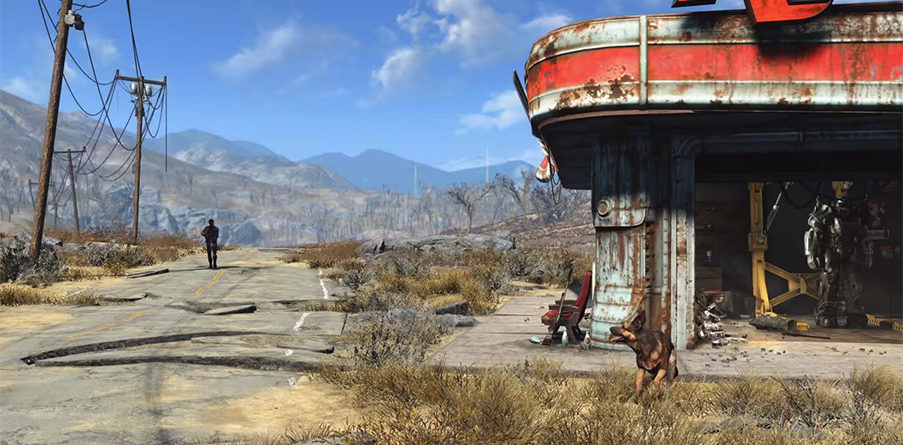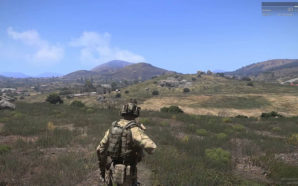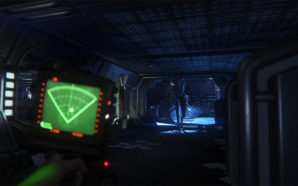No Turning Back
Fallout 4 is a ‘milestone’ in franchises history, a turning point which the series itself may never be able to successfully splinter off from with future titles, regardless of which developer takes it under its wing. It asks several difficult questions regarding the definition and foundation of the series as a whole. For fans of the series, the experience of playing Fallout 4 is a foreign one, there is an air of familiarity and nostalgia throughout, but it is heavily muddled through questionable design choices and liberties taken in regards to the ideas, themes and gameplay that are core to the franchise itself.
This series has always had a fascinating ‘back and forth’ attitude between these values, characterized most strongly by Bethesda’s Fallout 3 vs. the Obsidian developed Fallout: New Vegas. Yet, Fallout 4 is a peculiar collision between the free-form, mood oriented Fallout 3 and the more naturalistic map design of New Vegas, along with its faction focussed plot development. But Fallout 4 is the first Fallout game where you couldn’t guess it was founded upon classic, tabletop RPG’s if you didn’t already know. Fallout 4 is a heavily streamlined, action RPG, a piece of software first and a role-playing game second. While faction choice plays heavily into the outcome of the game’s ending, player choice has never mattered less in a Fallout game (maybe except in Fallout Tactics).
In terms of the scope of the wasteland, it is both incredibly vivid and ambitious in how it constructs its urban areas and disappointingly compact when it comes to fleshing out the rest of the game world. Fallout 4 has some of the worst side-questing in any Bethesda game, yet conversely is a massive accomplishment in visual world-building. However it is a severely disjointed, unevenly paced misfire in the narrative and world-building department. The dialogue is consistently better than the majority of Fallout 3, especially in terms of delivery and timing, but the conversation system itself is a reductive, buggy disaster of epic proportions. This disappointed me as a long-time series fan, it is upsetting to see a franchise so full of character and charm, stripped away in a bid to appeal to the most mainstream, Neanderthalic video game consumers.
Human Error
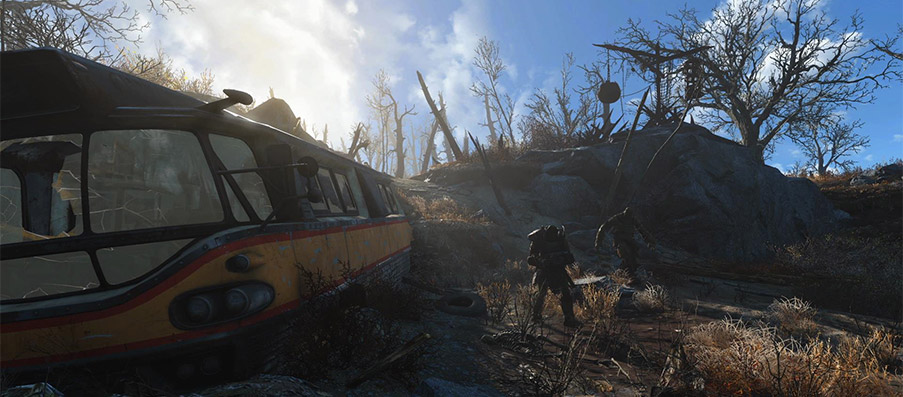
Photo Credit: https://fortunedotcom.files.wordpress.com/2015/11/fallout4.jpg
So many of the previous games accomplishments in one key element of its design are subverted, by awkwardness in so many others. It makes you wonder where the franchise is really going, because the game truly does meander down new and unprecedented directions. However, the value of those directions are going to be highly subjective, based on what Fallout means to you as a franchise and what elements of the series iconography and design history define the experience for you as a player. For me, Fallout 1 & 2 were the games that set the tone. Fallout 4 continues in the tradition of those games in some ways, in the general mood and in the visual aesthetic, yet the game chooses to cast aside many of the role-playing features that made those earlier role-playing games so beloved.
The area where Bethesda most clearly dropped the ball is in the games dialogue system, the clearest reason being you will never have more, or less, than four dialogue choices within any given conversation. This just simply doesn’t work in the grand scheme of the overall gameplay experience, it’s such a confounding oversight in the design of the game that the only possible explanation for the system is that of ‘pandering’. Pandering to the audiences of games like Dragon Age and Mass Effect, where players choice in dialogue is heavily streamlined, yet in a way that cleverly disguises the illusion of choice or consequence.
What is especially confusing, is that your character within dialogue never has the opportunity, throughout the hundred of hours spent in the wasteland, to simply reply with “no”. Between this and the inability to opt out of quests, it would seem that the developers really wish for you to complete every task in the game with your very first character. This is at odds with the games design, the specialization you level your character into warrants multiple playthroughs to explore skills and perks you may have not developed during your first run of the game, yet quests and dialogue negate player choice and variation, meaning there is little reason to play the game a second time.
You cannot say “no” when villainous organizations ask you to do cruel, villainous actions within the game world. But instead, you sure as hell can reply to moreorless every NPC in every main and side-quest with the ‘sarcastic’ option. This is meaningless without context. Is it a sarcastic agreement? Disagreement? Insult? It says sarcastic, nothing more, nothing less. It is an adjective, one word, it’s place in the dialogue system adds nothing to the overall experience, rather it adds to the already painfully restricting choices within the dialogue itself.
Following in His Footsteps
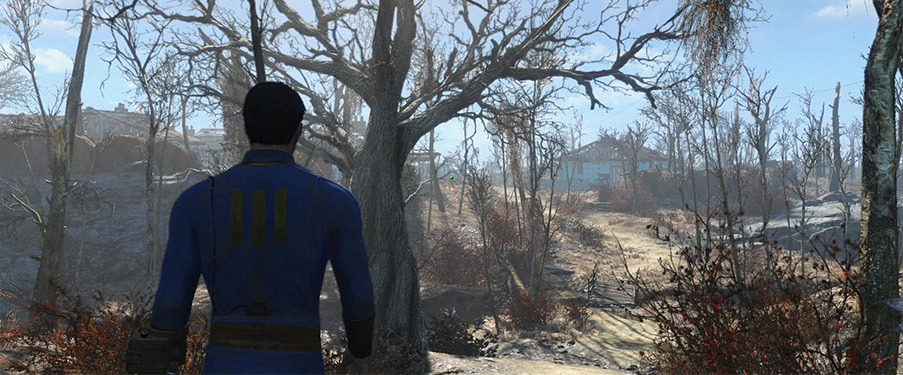
Photo Credit: http://digitalspyuk.cdnds.net/15/25/1600×800/landscape_gaming-fallout-4-e3-screenshot-20.jpg
It’s the best Fallout coat of paint ever executed, smeared onto what is essentially an Elder Scrolls game. It looks like Fallout, it feels like Fallout, it plays like Fallout – in combat at least, but when it comes to questing, it’s Skyrim. The side-quests have little in the way of variety, or little interaction with the main quest. The ability to keep playing after the credits roll reduces the impact of the ending. The ending, what little there is, is superficial, because none of the many sidequests you complete or choices you make, really affect it other than the pre-set choices you make in the main quest. Fallout has always been about consequences, not choices.
Fallout 4 floods you with lots of choices, but with little consequences, those choices are false, and have no meaning. You can play, level and live within the simulated wasteland of Fallout 4 endlessly, that isn’t the Fallout I know. Fallout needs a definitive end, so that the patchwork of your decisions made throughout your experience can be examined as a whole. This is a core element of the experience, and to disregard such an essential feature of the series speaks volumes of Bethesda’s attitudes towards the franchise in the modern era, coupled with a severe lack of understanding of what makes this series so special. It’s clear that Fallout 4’s conception of what’s meaningful about the franchise, is more a part of Bethesda’s exploration of new gameplay rhythms, rather than a modernization of the series traditional elements.
Bethesda are kings of world-building from a visual standpoint, but how many interesting stories can that world possibly tell? The answer, in regards to Fallout 4, is unfortunately very little. Truly exciting, open ended and choice reactive quests are too few and far between. Far too many of these quests are overly simple, there are a myriad of fetch-quests and base clearing affairs that made it feel like I was fast travelling back and forth to complete the most basic of tasks without any particular story pay off. The enjoyment from side-questing isn’t the loot, it’s the story the quests tell. Fallout 1 & 2, New Vegas and to a lesser extent, Fallout 3, completely nailed this approach to quest design.
Interesting stories are what we explore these game worlds for, the high level guns and armour are simply ways to keep us treated throughout the experience, as well as to give the player another incentive (outside of intrigue into the narrative) to finish their objectives within the game world. Fallout 3’s melancholy magic was short-lived, but hit hard. New Vegas’ surreal, anarchistic politics and humour had me glued for well over 200 hours and continues to draw me back in 7 years on from its initial release.
Future Imperfect
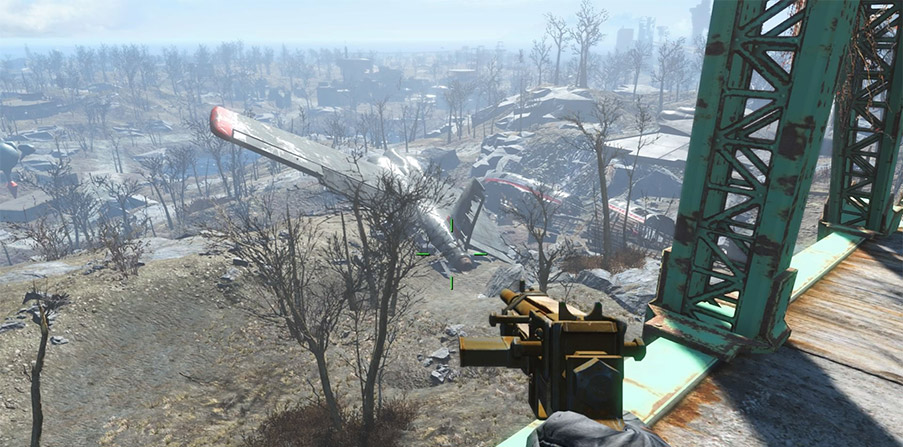
Photo Credit: http://www.mobygames.com/images/shots/l/873075-fallout-4-playstation-4-screenshot-plane-crash-site.jpg
Fallout 4 is ‘fine’ for now (despite how the inner, dormant fanboy that resides within myself genuinely feels about the game), but considering the legendary legacy of this series of games, there’s no way it’s a new gold standard for it. A lot of this has to do with the underwhelming reality of delayed innovation in the games business, it iterates on a standard set by Bethesda seven years ago, rather than making Fallout play in some kind of spectacular new fashion, which is exactly what the developers were trying over seven years ago with Fallout 3. Maybe it’s time to consider that Bethesda may very well be a one-trick pony when it comes to treating franchises outside of the Elder Scrolls.
Not only is there the expected lack of polish in Fallout 4 with it’s tirade of bugs, outdated visuals, choppy performance and sub-par voice acting, but there is a distinct lack of understanding in regards to the Fallout brand. What’s saddening, is that Bethesda can get away with this sort of business practice, consumers have come to expect this and yet buy their games anyway, any other developer would not have gotten away with this many technical and fundamental design flaws in a game. Yet even if the game did feature the most intricate combat, state of the art visuals and top tier voice work, Fallout is still a caricature of its former self in Bethesda’s hands. Obsidian know how to make a Fallout game, a role playing game, Bethesda on the other hand, knows how to make money. In the eventual announcement of Fallout 5 in the many years to come, I can only wonder if they will somehow get this series wrong… again.




